-
JOCKEY (Clint Bentley and Greg Kwedar 2021)
CLINT BAILEY, GREGG KWEDAR: JOCKEY (2021)
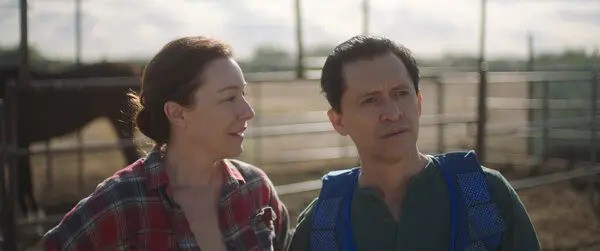
MOLLY PARKER AND CLIFTON COLLINS JR. IN JOCKEY
The old warrior theme refinished with rich patina
Sheri Linden, in Hollywood Reporter, speaks of Jockey as "achieving the kind of seamless fusion of narrative and documentary that Nomadland strives for but only sporadically achieves." Enough said.
Clint Bentley and Greg Kwedar (Transpecos) are filmmaking partners. Last time Kwedar was the director. This time it's Bentley, who grew up as a jockey's son and aware of that circus-carney world of touring tracks and getting by, who takes the helm.
This low keyed film has things in common with Chloé Zhao's first feature, The Rider, including a protagonist's visit to the hospital to see someone more severely injured than him riding horses, when he himself may wind up having to stay off them to save his life. But what's different is that here the three central actors are not found people used as actors like the injured rodeo cowboy played by Brady Jandreau in The Rider but acting pros given every opportunity to do their stuff, which they do impressively. While Jockey feels like an artily shot doc for the first five minutes, it's soon clear this is very much a dramatic feature.
First among equals is Clifton Collins Jr., the veteran character actor, whose performance was greatly admired at Sundance. He is fiftyish and a bit tall and heavy for a jockey but seamlessly plays Jackson Silva, a mid-level rider in his mid-forties. In this profession that's over the hill: race riders take a body beating second to none. Jackson has broken his back three times; he is racked with pain; he goes numb on one side; he risks losing the use of his legs, and is looking at serious disability down the road. Collins plays the traditional beats of the warrior facing the last battle here with exceptional salt and soul. Much of the action is to be read in his face as shown in closeups by Brazilian dp Adolpho Veloso, who shot in very wide screen ratio. Veloso's love of the magic lights of dawn and dusk and profile shots is a little excessive - it see,s rarely midday here - but he provides a lovely perpetual twilight that's a metaphor for the life we're gazing into.
The drama here is how a horse racing pro must face a career's end just as a 19-year-old claiming to be his son arrives on the scene. Moises Arias, who is jockey-small, as the kid Gabriel Boullait and Molly Parker (of "Deadwood") as Ruth Wilkes, Jackson's longtime trainer-cohort almost-lover, also display admirable acting craft, Arias for breathtaking understatement, Parker for old-shoe warmth.
The film was shot at Surf Paradise Racetrack in Phoenix, Arizona, where the filmmakers coaxed real jockeys and grooms into playing themselves, when a race at another track didn't lure them away. Like many local tracks Surf Paradise is faded in the foreground because the betting public has to a large extent quit attending races in favor of betting on and watching them remotely; but in the background the horses and crew are still all there to be captured on film.
A jockey's "chapel" at this track is the scene of such men grousing and joking about their injuries. The film shows horses, not races. The races are conveyed twice by showing only Jackson, up close: again it's his face that tells us all we need to know.
There's also a brilliantly gifted horse, Dido's Lament, found for a song by Ruth Wilkes, and big race coming up, and a diagnosis for Jackson "that serves the same function as those scenes in all the Rocky movies where a doctor warned Rocky Balboa that if he got in the ring again he'd go deaf or blind or suffer brain damage. . ." as is pointed out by Matt Zoller Seitz in his affectionate, ruminative review on RogerEbert.com - one of a number of admiring ones of this small but distinctive movie.
Don't come to Jockey for a fully fleshed-out story or originality of theme: the critics who sought those left unsatisfied. This is a character study, and an acting feast that serves up a slice of authentic track career life. Its storyline is just a light framework for its wistful sadness. It feels seedy and downbeat, but that's the muddy, rough-hewn world we're in here; and the filmmakers put a sweet spin on things. Jackson has denied, welcomed, cursed, embraced Gabriel, painfully loses his last race but sees the kid has done well in it and that brings a final smile. And when Clifton Collins, né Clifton Gonzalez Gonzalez and himself descended from riders, cracks a smile, it has ripples of meaning that may stay with you for days. Because of its greater dramatic heft, this movie takes us into the world of a man who must give up riding even better than The Rider does.
The sounds scored by Bryce and Aaron Dessner of The National are filled with subtle looming dawns and dusks, like Veloso's images.
Jockey, 94 mins., debuted at Sundance Jan. 31, 2021, shown thereafter in a dozen other international festivals including Toronto, Zurich, Busan, the Hamptons, Brisbane and Stockholm. US theatrical release by Sony Pictures Classics in New York and Los Angeles on Dec. 29, 2021. Rolling out release in early 2022 including Jan. 21 in San Francisco, Jan. 28 in the East Bay, Feb. 11 Santa Cruz Metacritic rating: 76%.
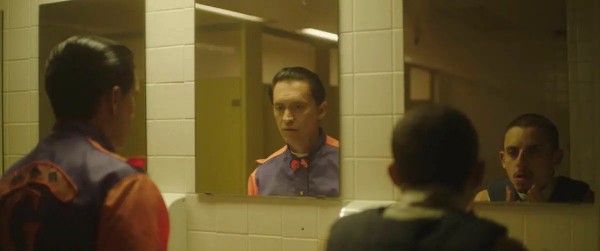
CLIFTON COLLINS JR. AND MOISES ARIAS IN JOCKEY
-
MOTHERING SUNDAY (Eva Hussun 2021)
MOTHERING SUNDAY - RELEASE DAY MARCH 25, 2022
EVA HUSSON: MOTHERING SUNDAY (2021)
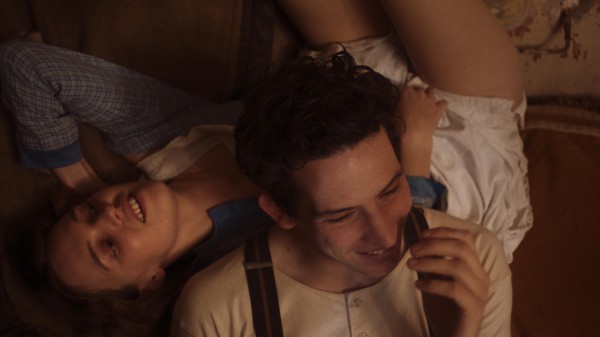
ODESSA YOUNG AND JOSH O'CONNOR IN MOTHERING SUNDAY
TRAILER
A French director sexes up the world of "Downton Abbey" in her Graham Swift adaptation
Mothering Sunday, adapted from the eponymous novel by Graham Swift, is beautiful, bold, sad, experimental, well acted - yet not quite right. It jumps around in ways that might work in a book, a prize-winner that's been called the author's best work. But "jumps" is misleading because it suggests rapid actions, and this film moves very slowly.
Mothering Sunday's plethora of shifts forward and backward slow down what is already rather too leisurely, in the meticulous and minute movement of individual scenes, held up by many sensual, almost tactile closeups. They make you want to stop and look even closer - which you can if you're watching a screener as I was, and which you also can, without even needing to hit the space bar, if you're reading a book. But when it is all done, this film leaves an imperfect sense of an action or a passage of time. To quote the quotable Peter Bradshaw in the Guardian "there is "something a bit indulgent and classy about the unvarying andante pace."
"Mothering Sunday" was a day when servants got time off to visit family. Jane Fairchild (Australian actress Odessa Young of Shirley), being an orphan who's been in service since the age of 14, is given leave by Mr. Godfrey Niven (Colin Firth, well dressed but bland)simply to spend the day on her own. She pretends to go off on her bike to ride and read a book from the Niven library, but she's had a secret telephone signal from her clandestine upper class lover, Paul Sheringham (Josh O'Connor, the acclaimed Prince Charles of "The Crown," also interesting here) that his entire family is off for a large formal picnic with the Nivens at Henley, and the great Sheringham family house is available for them to make love in.
The resulting long, sensual scene is arresting not only in its beauty and in O'Connor's striking performance but for all the bold and extended nudity. After the lovemaking is over Paul tells Jane to linger and she does, wandering around the house naked, looking at books, noshing on a meat pie and bottle of ale. Not only that, beforehand Paul walks around naked before the camera and there's more male frontal nudity than you'll see in a month of Sundays. This is likely to be more remembered than the the lingering bereavement of the two families who have both lost two sons in the War; or the the sadness of the finale of this central event; or things, also sad, that happen later in the time-scheme; or Olivia Coleman's ill-humored behavior. Olivia Coleman is nearly always ill-humored. It's only when she's pleasant that it's surprising. There are questions about Jane. How come she has such a neutral, educated voice? Why isn't there a clear-cut difference of class between her and Paul? And how are we to know that she later becomes a famous novelist if her narrative voice in the book has been removed from the film?
As for the nudity, be it known that the debut film of Eva Husson, who is French, is called Bang Gang: A Modern Love Story (2015), and is a non-stop group sex orgy of well-off French teenagers in the summertime. Her second film, (Girls of the Sun, 2018), a flop about women fighting ISIS in Kurdistan, seemed to be an attempt to atone for the sheer pornographic indulgence of her first. It's as if a bit of Bang Gang spilled over into that scene between Odessa Young and Josh O'Connor. But be it also known that Jane's wandering around naked in the great house is part of the novel, not a risqué interpolation.
The rest is standard Downton Abbey stuff, but with the sensuous closeups by dp Jamie Ramsay breathing down the necks of the well-dressed toffs, Olivia Coleman pouting, Colin Firth being wimpy and sweet, servants popping champagne and everyone remembering that their sons died in the War - as did the boyfriend of Milly (Patsy Ferran), Jane's confidante the kitchen maid. Swift's novel blends sadnesses, first that of the aftermath of World War I, then the tragedy that happens after Jane and Paul's idyll, then - while an older Jane, who got a job at a bookstore and left "service," is seen becoming a very successful writer - the fading away of this new Jane's new man, a brilliant and very loving philosopher known only as Donald (the talented Nigerian-British actor Sope Dirisu). A final sort of coda (but not without slipped-in peeks back at the young Jane) is a scene with Glenda Jackson as the elderly Jane, occupying a comfortable London house alone and called to the door to be asked by a crowd of journalists what she thinks of winning the biggest prize of all. She's blasé, but she thinks it's great.
One might well argue that the events of that "Mothering Sunday" day in 1924 alone would have made a good movie, without weaving in so many flash-forwards of Jane's later life as a successful novelist. Graham Swift likes it complicated, as was in evidence in the film of his Last Orders (2002) - though I can't greatly recommend that, even though it was directed by Fred Schepisi.
Leslie Felperin in her Hollywood Reporter review observes that Mothering Sunday constitutes "a posh package that should appeal" not only "to older viewers who swoon for 'Downton Abbey‘s' mix of frocks and manners" but also to "a younger demographic that likes a more carnal blend of romance and riches, as in Netflix series 'Bridgerton'." This is probably true, but is a commercial viability assessment a bit above my pay grade. What I might be qualified to note is the absence of the "intensely literary interior voice" (Felperin again) of the book's protagonist, carved away here, leaving the sexy, slow-moving visuals and the book's basic melodrama and thus giving us a story about a writer without the writing - but with one very sexy scene between Odessa Young and Josh O'Connor.
Mothering Sunday, 104 mins., debuted in the "Premiere" section of Cannes Jul. 9, 2021, and showed in about a dozen other international festivals including Toronto, Vancouver, the Hamptons, BRI London, Mill Valley and Chicago. US release begins Fri., Mar. 25, 2022 in New York (four locations) and Los Angeles (two locations), moving on later. Opening in San Francisco Apr. 1 and in other Northern California locations Apr. 8. Metacritic rating: 78% (originally; now 67%). Not yet available online.
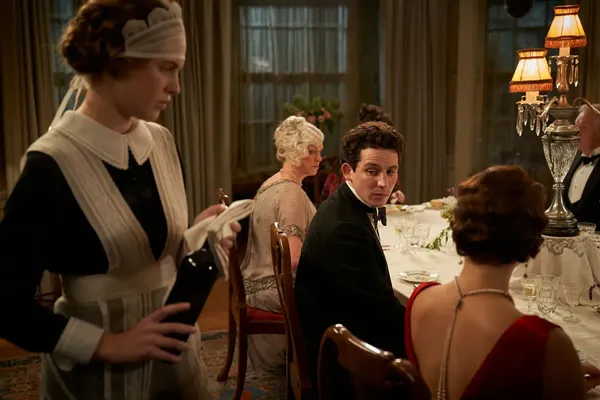
ODESSA YOUNG, JOSH O'CONNOR IN MOTHERING SUNDAY
-
JIMMY CHIN, ELIZABETH CHAI VASARELYI: THE RESCUE (2021)
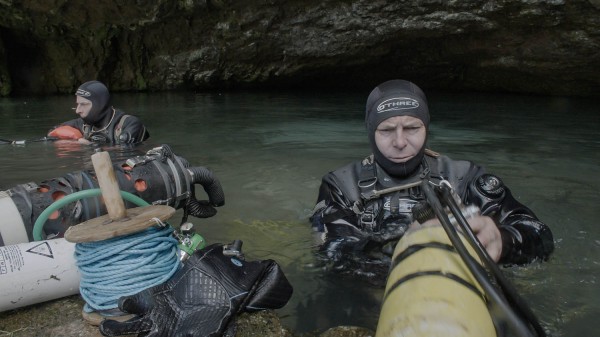
JOHN AND RICK, THE UK ODDBALLS WHO SAVED THE BOYS
Compelling retelling of the Thai cave rescue from the cave divers' POV
This film takes you deep into a flooded cave, a muddy, twisty, dark place that's terrifying, and into the world of men who love to be there. Their hobby enables them to carry out a tremendously challenging rescue operation with the whole world watching. Nobody else could have done it. But they couldn't have done it either without a joint international effort and above all the bravery and endurance of the boys (age 11 to 16) who spent 13 days trapped in the cave, nine of those days before anyone found them or could communicate with them. This tells the inside story of the men, not so much of the boys. The boys' story remains to be fully told. But this is still a great story. And incredibly suspenseful.
The Rescue is a film the work of the pair responsible for the Best Documentary Oscar film of 2018, <a href="https://www.chrisknipp.com/writing/viewtopic.php?f=1&t=4079">Free Solo</a>, so you know, or at least strongly suspect, that it will be well made, indeed exceptionally so. It's about the rescue of the Wild Boars youth soccer team from the flooded cave in northern Thailand in the summer of 2018, so you know it will be upbeat, because the boys and their young coach were saved. That said, this is a very different film and event from Free Solo and ace rock climber Alex Honnold. But it is as uplifting as you could want it to be, a happy and inspiring story of courage and persistence that makes you think hard about goodness and dedication to the welfare of others.
Free Solo is above all the analysis of an unusual individual, a world-class risk taker of extraordinary skill and very much a not very well-socialized loner, whose climactic exploit required that people, the film crew, and even his girlfriend keep their distance. The Rescue is about saving thirteen people, not one, who were isolated from the world against their will; and according to reports upwards of ten thousand people participated in various ways in their rescue. The one film is a story of purposeful solitude, a lonely exploit; the other, of extraordinary teamwork, a disaster involving a whole nation that the whole world watched and many nations shared in resolving.
One thing critics of The Rescue point to is this: The filmmakers are not participants this time. Not only that, but they were not able to speak to the boys or their families in making this film. They speak to a lot of people, and they get some of the participants to reenact moments from the events. But they don't get inside anybody's head quite the way they do Alex's. Some critics also find the pace of this film "languid" at the outset. Okay: this isn't as unique a film. But it's a richly detailed account of an extraordinary event and it's highly recommended.
What happened was that after practice, the rural Wild Boars northern Thailand junior soccer team, aged 11-116, went into the cave with their 25-year-old assistant coach to explore. This was not so unusual as it sounds. It was a traditional play spot for the boys. But it was midsummer, June 23, and the monsoon season, coming on early, brought a very heavy rain that flash-flooded the cave and trapped the boys and coach. It wasn't until nine days later that anyone was able to find them - over four kilometers from the mouth of the cave, on a high ledge where they had taken refuge. When the cave divers came and found the boys, they had cameras. The sight of them is unforgettable.
We hear from the Thai honorary British consul and a commander of the Thai navy SEALS. The latter played a very important role. We also hear from a young Thai woman who had just recently been in England and met a cave diver and they had apparently fallen in love. She was back home. These exceptional events brought him to near where she lived. We see numerous brief news clips to show how big a story this was all over the world. We also see extensive coverage of the operation to remove flood water from the cave - a prodigious effort essential to the rescue's success. Pressure of time makes this story so suspenseful. The boys had to be extracted before there was another big wave of monsoon rain that would have made rescue impossible. was almost impossible anyway.
We hear from a lot of people. But the key figures in the rescue are a small handful of mostly British cave divers, headed by retired firefighter Rick Stanton and his frequent diving partner, John Volanthen, an I.T. consultant, both middle-aged men who carried out this odd, to most people scary and forbidding pursuit as an intense, beloved hobby for many years. They're an elite, oddball crew - as it turns out, rather loners, so not so unlike Alex Honnold, after all. It turns out navy SEALS just don't have the skills for swimming through a long, twisty, irregular, narrow flooded cave passageway. (One of them died due to running out of oxygen.) It was a while before it was clear that only specialized cave divers could do the job and Rick and John were called in, referred by the highly visible local British expat Vernon Unsworth.
When the divers found the lost team of boys and their young coach , huddled, brave but forlorn, on their ledge, the enormity of the problem became clear. How could they get them out? It required swimming for several hours underwater with an oxygen tank. The rest of the film depicts the solution found and the three-day operation to bring the boys out, one by one. The solution, spearheaded by an Australian cave diving doctor who doesn't think it will work, requires the support of the United States military, the Royal Thai Navy, the engineers behind a massive groundwater pumping operation, and a handpicked gang of additional divers from across Europe. (No need for Elon Musk's proposed miniature submarine, never mentioned here.)
To tell this, Chin and Vasarhely skillfully merge news and hitherto unseen footage of the rescue with face time and seamlessly blended reenactments into an intense, edge of the seat tale. There remains the story of the boys, how it was for them. The filmmakers manage to cover their omissions and what Jessica Kiang calls in her <a href="https://www.nytimes.com/2021/10/07/movies/the-rescue-review.html">New York Times review</a> a "defiantly outsider perspective" with the compulsiveness of the events and their narrative skills that make this, as Dallas King of <a href="https://www.flickfeast.co.uk/reviews/film-reviews/the-rescue-2021-film-review/">Flickfeast</a> called it yesterday, "an incredibly empathetic experience," one we follow as if it were going on as we watch, and we were watching it firsthand. This is a special kind of documentary filmmaking at which Chin and Vasarhelyi are masters. The boys' POV remains to be heard from, but the rescue couldn't be told better than this.
The Rescue, 107 mins., debuted at Telluride Sept. 2021, showing also at Toronto, Camden, Hot Springs, Woodstock, the Hamptons and Jihlava (Czech Republic), a Natural Geographic film with a US theatrical release starting Oct. 8. Screened at Landmark Shattuck, Berkeley, Oct. 29. <a href="https://www.metacritic.com/movie/the-rescue-2021">Metascore: 86%</a>.
 Posting Permissions
Posting Permissions
- You may not post new threads
- You may not post replies
- You may not post attachments
- You may not edit your posts
-
Forum Rules






 Reply With Quote
Reply With Quote



Bookmarks